|
|
|
Sort Order |
|
|
|
Items / Page
|
|
|
|
|
|
|
| Srl | Item |
| 1 |
ID:
000445
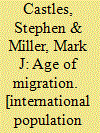

|
|
|
|
|
| Edition |
2nd ed
|
| Publication |
London, Macmillan, 1998.
|
| Description |
xx, 336p.
|
| Standard Number |
0333732448
|
|
|
|
|
|
|
|
|
|
|
|
Copies: C:2/I:0,R:0,Q:0
Circulation
| Accession# | Call# | Current Location | Status | Policy | Location |
| 041747 | 325/CAS 041747 | Main | On Shelf | General | |
| 042914 | 325/CAS 042914 | Main | On Shelf | General | |
|
|
|
|
| 2 |
ID:
153870
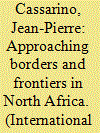

|
|
|
|
|
| Summary/Abstract |
Recent policy developments in the western Mediterranean, especially in North Africa, pose an important puzzle for our understanding of borders and frontiers and the ways in which they are politically addressed. This article sets out to analyse their various implications for patterns of interdependence among states, territoriality, sovereignty, mobility, and last but not least, for domestic politics. By drawing on a vast corpus, the study provides a broader interpretation of such implications which, as argued, cannot be captured with exclusive reference to securitization and processes of demarcation. This endeavour is important to explore how the power dimension in the borderland may interact with other dimensions of the border. Each disciplinary approach discussed in this study, including its heuristic devices, provides a valid explanation of the oft-cited disconnect that scholars have observed in North Africa between the territorially bounded ideal-type of the nation-state and the ways in which it is concretely translated, if not reinterpreted, by borderlanders. An important insight is to venture far beyond disciplinary dogmatism with a view to addressing an array of drivers (be they political, historical, social, economic and geostrategic) that propels bordering practices in North Africa and determines, by the same token, their effects on the ground.
|
|
|
|
|
|
|
|
|
|
|
|
|
|
|
|
| 3 |
ID:
128206


|
|
|
|
|
| Publication |
2014.
|
| Summary/Abstract |
International migration and diaspora has been one of the integral parts of the recent development discourse in academics as well as the policy domain, especially in the context of developing countries. Diaspora is seen as one of the emerging development actors as diaspora is perceived as creating economic, social and political capital through global network (Gaillard 1991, Meyer Brown 1999). Multilateral organizations have taken note of the significance of diasporic contribution towards the global development.
|
|
|
|
|
|
|
|
|
|
|
|
|
|
|
|
| 4 |
ID:
096675
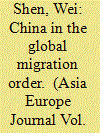

|
|
|
|
|
| Publication |
2010.
|
| Summary/Abstract |
China has a long history of internal and international migration and has a significant number of diasporas around the globe. From being predominately a country of emmigration, China has now witnessed growing rates of return migration, due to its rising economic status in the world. This article seeks to provide a historical review of international migration from China in different periods, from ancient China to after the founding of the People's Republic of China. It also examines the recent trends of new waves of Chinese migration such as student migration to Europe and touches on issues of government policy and the role of overseas diasporas in the course of Chinese history. By analysing a wide range of data, including published statistics and published papers, this paper illustrates the evolution of changing patterns of international migration from China and its impact for China on the rest of the world.
|
|
|
|
|
|
|
|
|
|
|
|
|
|
|
|
| 5 |
ID:
082393
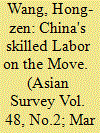

|
|
|
|
|
| Publication |
2008.
|
| Summary/Abstract |
This paper discusses how Taiwanese overseas investment creates an ethnic Chinese skilled labor market in Asia. Low costs, no language barrier, and the cultural "lived Taiwan experience" are the benefits. Through three different channels-internal corporate transfer, social networks, and placement agencies-skilled labor from the People's Republic is mobilized to work overseas.
|
|
|
|
|
|
|
|
|
|
|
|
|
|
|
|
| 6 |
ID:
133647
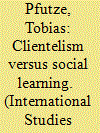

|
|
|
|
|
| Publication |
2014.
|
| Summary/Abstract |
Most research on the effects of international migration on democratic institutions in sending countries focuses on how emigration changes the civic and democratic values of those left behind. Little attention has been given to how the additional income provided by migrant remittances alters the incentive structure of the political actors involved and how this will affect political outcomes. This paper develops a voting model that accounts for the effect of higher income through remittances and shows that its expected effects on voter turnout patterns differ in important ways from those of improved civic values. Taking these predictions to the data, it is shown that, for the case of Mexican municipal elections over the year 2000-2002 period, the empirical evidence strongly supports the notion that international remittances had a positive effect on electoral competitiveness in Mexico by reducing the clientelistic power of the formerly dominant state party (Institutional Revolutionary Party). This result is robust to the use of instrumental variables.
|
|
|
|
|
|
|
|
|
|
|
|
|
|
|
|
| 7 |
ID:
154064
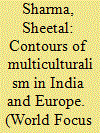

|
|
|
|
|
| Summary/Abstract |
Multiculturalism can be understood and explained as a fact, as a value and as a policy. In the contemporary milieu of ever increasing international migration and mixing of cultures, cultural diversity is inevitable. In this context to understand multiculturalism in all its dimensions becomes all the more relevant. Both India and Europe are multicultural. If on one hand the magnitude of ethnographic-cultural diversity of India and Europe presents interesting patterns of ‘unity in diversity’ then on the other hand it poses challenges of social integration of people from different cultural and ethnic background.
|
|
|
|
|
|
|
|
|
|
|
|
|
|
|
|
| 8 |
ID:
132321
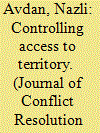

|
|
|
|
|
| Publication |
2014.
|
| Summary/Abstract |
Previous scholarship has largely failed to address the effect of economic interdependence on issue areas other than interstate conflict. This study seeks to redress this lacuna by focusing on states' visa policies and examining the impact of trade and capital interdependence in the context of transnational terrorism. The article argues that economic ties affect visa policies through a reconfiguration of preferences and the opportunity costs of economic loss and by tempering the impact of terrorism. To support this claim, the study conducts statistical analysis using directed dyad data on the visa policies of 207 states and independent political units. The article shows that the impact of economic interdependence is contingent on whether states are directly targeted in attacks of terrorism or face indirect threats from global terror. The study finds that economic incentives overwhelm security concerns when threats are indirect but have relatively limited influence, given threats against a state's own citizens or territory.
|
|
|
|
|
|
|
|
|
|
|
|
|
|
|
|
| 9 |
ID:
073828
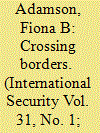

|
|
|
|
|
| Publication |
2006.
|
| Summary/Abstract |
International migration has moved to the top of the international security agenda, due in part to concerns that migration flows provide conduits for the spread of international terrorism. Although such concerns are not entirely unfounded, they must be placed within the broader context of the range of impacts-both positive and negative-that international migration flows have on states' core national security interests. Migration flows affect at least three dimensions of national security: state capacity and autonomy, the balance of power, and the nature of violent conflict. Overall, migration management presents a far greater security challenge to weak and failing states than to advanced postindustrial states. States that are able to formulate and implement migration policies that harness the power of international migration will be more secure, rather than less secure, in the new globalized security environment.
|
|
|
|
|
|
|
|
|
|
|
|
|
|
|
|
| 10 |
ID:
128140
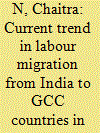

|
|
|
|
|
| Publication |
2014.
|
| Summary/Abstract |
Migration and movement of human population have always been an integral element in the history of mankind. India has been experiencing large-scale migration to foreign countries since centuries and in the current globalised era. The International Labour Organization - ILO has classified international migration for employment in to two major categories including settlement migration and contract migration (ILO, 1989). The contract migration is unique phenomenon practiced in few western countries but in particular in the GCC countries post oil boon during 1970's as the governments used sharply higher oil revenue to build infrastructure and housing, and expand the economy (Seccombe, 1985).
|
|
|
|
|
|
|
|
|
|
|
|
|
|
|
|
| 11 |
ID:
132506


|
|
|
|
|
| Publication |
2014.
|
| Summary/Abstract |
Bilateral flows of international migrants exhibit tremendous variance both across destination countries and over time. To explain this variance, studies of international migration tend to focus on economic determinants such as income differentials or on social conditions such as the presence of coethnics in certain destination countries. The authors argue that migration is driven not solely by economic or social determinants; rather, the political environment across destinations plays a substantively large role in influencing bilateral migration flows. They test the importance of the political environment-citizenship rights and the prominence of right-wing parties-using data on migration flows from 178 origin countries into 18 destination countries over the period 1980-2006. They find, even after controlling for a variety of economic, social, policy, and international variables, that variation in political environments across time and destination plays a key role in observed patterns of international migration
|
|
|
|
|
|
|
|
|
|
|
|
|
|
|
|
| 12 |
ID:
128182
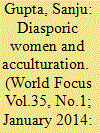

|
|
|
|
|
| Publication |
2014.
|
| Summary/Abstract |
Diasporas are the human face of the globalization process. The contemporary importance of Diasporas can be related to the seemingly contradictory historical processes of consolidation of national cultural identities and large international migrations. Though the phenomenon of migration is as old as the existence of humanity, international migration on a large scale started during colonial times. Labour demand, political conflicts, technological changes and trade and commerce together, contribute to international migration becoming one the most important determinant of modern global change.
This paper attempts to explain the cross cultural conflicts, trauma, isolation, aspirations and dilemmas of the Indian Women immigrants in Jhumpa Lahiri's The Namesake , especially Aashima Ganguly, who find herself in between the native culture and host culture and her trishanku experience of being neither in Calcutta nor in America which is at the very centre of diasporic trauma. Ashima is a true representative of the majority of women expatriates who are reluctant to change or adapt to the culture of the host country. But still she sacrifices all her comforts for the sake of her family and like the typical traditional Indian women; her life revolves around her husband and children.
|
|
|
|
|
|
|
|
|
|
|
|
|
|
|
|
| 13 |
ID:
134044


|
|
|
|
|
| Publication |
2014.
|
| Summary/Abstract |
In this article, the authors compare two prominent examples of the East Asian middle-class transnational split family (TSF) form of international migration in which typically the mother accompanies children abroad while the father stays home to economically support the family: the "astronaut families" (taikong) in Hong Kong in the 1990s, and the "geese families" (kir?gi kajok) in South Korea in the 2000s. Many scholars have located the origin of this migration form in shared East Asian cultural values of familism; moreover, what appears to unite these East Asian TSFs is their shared instrumentalism. The authors argue, however, that the construct of cosmopolitanism-in which citizens share a deep-seated interest in membership in the global community of developed, liberal nations-allows for the appreciation of the distinctive characteristics of TSF migration in Hong Kong and South Korea. The authors analyze Hong Kong and South Korea's respective popular media representations of the rise and wane of the TSF migration pattern in order to elaborate on their particular cosmopolitanisms. During the rise period, Hong Kong's migration was a strategy to secure the region's foundational cosmopolitan identity, while South Korea's was motivated by the search for a newfound cosmopolitanism. In the wane period, the authors suggest that Hong Kong and South Korean cosmopolitanisms are converging. First, in both locations people have begun to question how effective sojourn abroad is for either acquiring or securing cosmopolitanism. Second, in both areas people have begun to recognize the possibility of living cosmopolitan lives at home.
|
|
|
|
|
|
|
|
|
|
|
|
|
|
|
|
| 14 |
ID:
133002
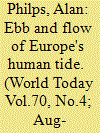

|
|
|
|
|
| Publication |
2014.
|
| Summary/Abstract |
For each country the orange area and the figure in light type represent the percentage of migrants in the population in 1990. The red area, with the bold figure, shows the proportion in 2013. In these UN figures, migrants are defined as those born outside their country of residence, including refugees
|
|
|
|
|
|
|
|
|
|
|
|
|
|
|
|
| 15 |
ID:
046338
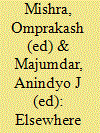

|
|
|
|
|
| Publication |
New Delhi, Lancer's Books, 2003.
|
| Description |
x, 290p.
|
| Standard Number |
8170950961
|
|
|
|
|
|
|
|
|
|
|
|
Copies: C:1/I:0,R:0,Q:0
Circulation
| Accession# | Call# | Current Location | Status | Policy | Location |
| 046451 | 325/MIS 046451 | Main | On Shelf | General | |
|
|
|
|
| 16 |
ID:
140558
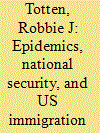

|
|
|
|
|
| Summary/Abstract |
What are relationships between epidemics, national security, and US immigration policy? This question is important because it sheds light on transnational or nontraditional security areas, American immigration policy, and a pressing issue for US leaders who have recently faced epidemics such as the West Africa Ebola outbreak that began in 2013. This article answers it and lays ground in the area by reviewing epidemics in world history, using International Relations and Security Studies works to specify dangers of contagions for states, and identifying three general immigration measures that American leaders have utilized from the seventeenth century to the present day to protect against contagions, which are (1) policies restricting entrance of foreigners thought to carry specified diseases, (2) the isolation or quarantining of immigrants with contagious disease, and (3) delegating the President with authority to stop immigration in the event of an epidemic abroad. This study has implications for research and contemporary US immigration policy.
|
|
|
|
|
|
|
|
|
|
|
|
|
|
|
|
| 17 |
ID:
073252
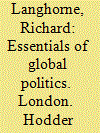

|
|
|
|
|
| Publication |
London, Hodder Education, 2006.
|
| Description |
xii, 372p.Pbk
|
| Standard Number |
0340816910
|
|
|
|
|
|
|
|
|
|
|
|
Copies: C:1/I:0,R:0,Q:0
Circulation
| Accession# | Call# | Current Location | Status | Policy | Location |
| 051532 | 909.83/LAN 051532 | Main | On Shelf | General | |
|
|
|
|
| 18 |
ID:
176381
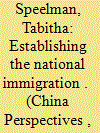

|
|
|
| 19 |
ID:
096677
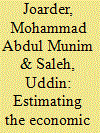

|
|
|
|
|
| Publication |
2010.
|
| Summary/Abstract |
Following Friedman et al. (2000), we have developed an economic model of Hundi (an informal money transfer system) behavior and is designated to identify the factors that determine the channels (formal or informal) used by remitters. The model is empirically tested using Tobit analysis for a sample of 132 returned migrants of greater Sylhet region in Bangladesh with work experience in 11 different host countries. Our findings suggest that sending remittances through Hundi first increases with age, peaks at one point, and then declines thereafter. It is observed that single or unmarried migrants are more likely to remit through Hundi, while relatively educated migrants have the opposite preferences. Cost and financing of migration have significant impact on an individual's decision to choose the remitting channel. It is also found that the nature of the migration and type of job abroad affect an individual's decision to use the remitting channel. Furthermore, migrants who have no ability to speak the language of the country of destination are generally more inclined to remit through an informal channel. Finally, migrants who receive low commission to remit, have families or relatives living in remote areas and mainly dependent on remittances, and have the opportunity to remit in holidays are more likely to remit through Hundi than their counterparts.
The draft version of this paper was presented at a seminar on Annual Asian Business Research Conference organized by World Business Institute, Victoria, Australia in BIAM Foundation, Dhaka, Bangladesh during 1-2 January, 2010.
|
|
|
|
|
|
|
|
|
|
|
|
|
|
|
|
| 20 |
ID:
186103
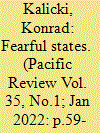

|
|
|
|
|
| Summary/Abstract |
How does the notion of state security inform national approaches to managing cross-border in-migration in the increasingly interconnected but volatile Northeast Asian region? This paper explores this question by focusing on the intermestic politics of labor importation. Specifically, it theorizes the multidimensionality and multifunctionality of security fears that inform Japan’s and Taiwan’s approaches to the admission of low-skilled foreign workers. The paper proposes a comprehensive conceptual framework that explicates these relationships and argues that Northeast Asian labor importation regimes were formed at the intersection of a threefold logic of state security. Whereas economic security acted as an enabling (inclusionary) factor in both Japan and Taiwan and motivated the acceptance of foreign workers, internal security in Japan and external security in Taiwan acted as constraining (exclusionary) factors, which directly and distinctively conditioned the resulting policies. Moreover, ever since their inception in the immediate aftermath of the Cold War, the divergent policy regimes have been interlocked in these economic-internal and economic-external dynamics of state security.
|
|
|
|
|
|
|
|
|
|
|
|
|
|
|
|
|
|
|
|
|